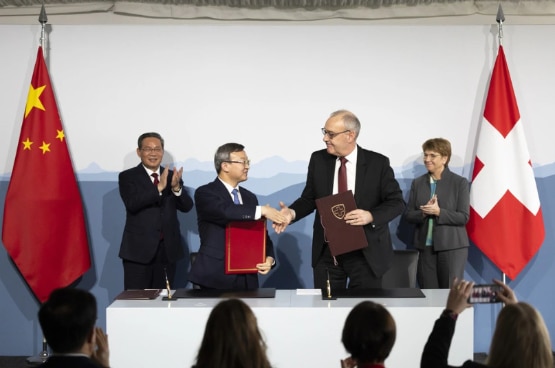Switzerland's Strong Response To Chinese Military Actions

Table of Contents
Switzerland's Diplomatic Response to Chinese Military Actions
Switzerland's diplomatic response to China's military actions has been characterized by a cautious yet increasingly vocal condemnation of human rights abuses and assertive engagement on issues impacting global security.
Condemnation of Human Rights Abuses in Xinjiang
Switzerland has issued several statements condemning the human rights violations in Xinjiang, specifically targeting the treatment of the Uyghur population.
- The Swiss government has publicly expressed its deep concern over reports of mass detentions, forced labor, and cultural suppression in Xinjiang.
- These statements often reference reports from the United Nations Human Rights Office and other credible international organizations.
- Switzerland has actively participated in international forums, leveraging its diplomatic influence to pressure China to improve its human rights record. This collaboration includes working with like-minded European nations to coordinate their diplomatic efforts and amplify their collective voice.
However, the effectiveness of Switzerland's diplomatic efforts remains a subject of ongoing debate. Its neutral status limits the scope of direct sanctions it can impose, necessitating reliance on multilateral approaches and collaborations with other nations to exert meaningful pressure.
Cautious Engagement on Taiwan and the South China Sea
Switzerland's approach to the Taiwan issue and the South China Sea disputes reflects a careful balancing act. While it hasn't explicitly endorsed any specific stance on Taiwan's sovereignty, Switzerland's public statements emphasize the importance of peaceful conflict resolution and adherence to international law within these regions.
- Switzerland has voiced its concerns about the militarization of the South China Sea and the potential for escalation of conflict.
- Its approach considers the significant economic ties with China, including substantial Swiss exports and imports. Any overly critical stance could jeopardize these vital economic relationships.
The Swiss strategy aims to promote dialogue and de-escalation while preserving its economic interests. This calculated approach highlights the inherent challenges of balancing neutrality with the realities of global power dynamics.
Economic Implications of Switzerland's Response
Switzerland's response to Chinese military actions carries significant economic implications, requiring careful consideration of its trade relations and financial sector involvement.
Potential Impact on Swiss-Chinese Trade Relations
China is a major trading partner for Switzerland. Swiss exports, including pharmaceuticals, precision instruments, and watches, are heavily reliant on the Chinese market. Conversely, Switzerland imports significant quantities of goods from China.
- A deterioration in relations could negatively impact Swiss exports, potentially leading to job losses and economic slowdown.
- Conversely, China could impose retaliatory tariffs or trade restrictions, further harming the Swiss economy.
To mitigate potential risks, Switzerland is actively exploring diversification of its trading relationships, seeking alternative markets to reduce reliance on China.
Swiss Financial Sector and Chinese Investments
The Swiss financial sector plays a crucial role in managing Chinese investments. Swiss banks and financial institutions have long-standing relationships with Chinese counterparts.
- Switzerland's response to Chinese military actions might raise compliance issues and increase scrutiny of Chinese investments.
- New regulations or stricter compliance standards could potentially impact the flow of capital and investment between the two countries.
Switzerland must navigate the delicate balance of maintaining strong financial ties with China while complying with international norms and regulations, including potential sanctions imposed by other nations.
Alignment with International Norms and Alliances
While maintaining its neutral status, Switzerland has increasingly aligned its responses to Chinese military actions with international norms and collaborated with other nations.
Collaboration with EU and other Western Nations
Switzerland, although not a member of the European Union, frequently collaborates with EU member states and other Western nations on issues of shared concern.
- Joint statements and coordinated diplomatic actions with these nations reflect Switzerland's commitment to upholding international law and human rights.
- This collaboration allows Switzerland to amplify its voice and exert greater influence on the international stage.
Such cooperation demonstrates a pragmatic shift in Switzerland's approach, demonstrating that neutrality does not equate to isolation or inaction on matters of global importance.
Role of International Organizations
Switzerland actively participates in international organizations like the United Nations, utilizing these platforms to promote its values and influence policy decisions related to China.
- Switzerland actively contributes to the drafting and negotiation of UN resolutions concerning human rights and international security.
- Its influence within these organizations is leveraged to promote accountability and adherence to international norms.
By engaging constructively within multilateral frameworks, Switzerland seeks to maximize its impact while remaining committed to its principles of neutrality.
Conclusion
Switzerland's response to Chinese military actions marks a significant departure from its traditionally cautious and neutral stance in international relations. This response encompasses vocal condemnation of human rights abuses, cautious engagement on regional disputes, and increasingly close cooperation with international allies. While maintaining its economic ties with China, Switzerland has shown a willingness to align with international norms, highlighting the evolving nature of its foreign policy. The economic implications, particularly for Swiss trade and finance, require careful monitoring. Further research is crucial to fully understand the long-term consequences of this evolving stance. Analyzing Switzerland’s response to future Chinese military actions will be critical for understanding the shifting geopolitical landscape. Continued monitoring and analysis are essential to assess the effectiveness of Switzerland’s approach and its broader implications for international relations.

Featured Posts
-
 David Walliams Cancelled Comment Leaves Lorraine Kelly Uncomfortable
May 21, 2025
David Walliams Cancelled Comment Leaves Lorraine Kelly Uncomfortable
May 21, 2025 -
 Vybz Kartels Skin Bleaching A Struggle With Self Love
May 21, 2025
Vybz Kartels Skin Bleaching A Struggle With Self Love
May 21, 2025 -
 Hotel Fire Tweet Leads To Jail Sentence For Tory Councillors Wife Appeal Awaits
May 21, 2025
Hotel Fire Tweet Leads To Jail Sentence For Tory Councillors Wife Appeal Awaits
May 21, 2025 -
 Groeiend Autobezit Drijft Occasionverkoop Bij Abn Amro Omhoog
May 21, 2025
Groeiend Autobezit Drijft Occasionverkoop Bij Abn Amro Omhoog
May 21, 2025 -
 Home Office Alebo Kancelaria V Roku 2024 Kompletny Sprievodca
May 21, 2025
Home Office Alebo Kancelaria V Roku 2024 Kompletny Sprievodca
May 21, 2025
